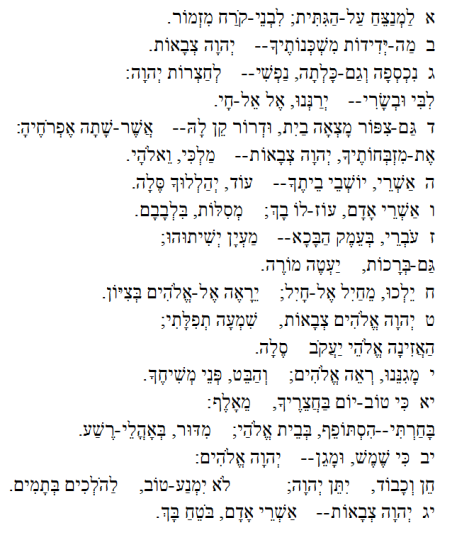
Psalm 84
To the choirmaster: according to The Gittith.
A Psalm of the Sons of Korah.
How lovely is your dwelling place,
O Lord of hosts!
2 My soul longs, yes, faints
for the courts of the Creator;
my heart and flesh sing for joy
to the living Creator.
3 Even the sparrow finds a home,
and the swallow a nest for herself,
where she may lay her young,
at your altars, O Lord of hosts,
my King and my Creator.
4 Blessed are those who dwell in your house,
ever singing your praise! Selah
5 Blessed are those whose strength is in you,
in whose heart are the highways to Zion.
6 As they go through the Valley of Baca
they make it a place of springs;
the early rain also covers it with pools.
7 They go from strength to strength;
each one appears before the Creator in Zion.
8 O Creator, God of hosts, hear my prayer;
give ear, O God of Jacob! Selah
9 Behold our shield, O Creator;
look on the face of your anointed!
10 For a day in your courts is better
than a thousand elsewhere.
I would rather be a doorkeeper in the house of my Creator
than dwell in the tents of wickedness.
11 For the Creator is a sun and shield;
the Creator bestows favor and honor.
No good thing does he withhold
from those who walk uprightly.
12 O Lord of hosts,
blessed is the one who trusts in you!
There are all kinds of Psalms. This Psalm is King David’s gratitude toward everything he went through in order to reach the source of the whole path he underwent. It marks the closure of all questions, disconnections and misunderstandings, whereby then comes the outburst of praise.
Psalms are impossible to comment on. They are a vessel similar to the Light, where discernments disappear and everything is swallowed in wholeness.
Why do we say that Psalms are written in wholeness when sometimes they sound like they are written out of pain, sorrow, lacks and requests?
Sometimes they do sound very much like outbursts of sorrow, or outbursts of lacks of understanding, pain, and lacks of wholeness, for example, as David escaped Avshalom, and how he had problems with Uriah. He had a very difficult life arranged for him, because it is Malchut (Kingdom), i.e. the King of Israel, who is in constant battles.
However, everything he wrote, despite sometimes revealing very deep sorrow, so deep that we do not understand its meaning, in any case, it is written out of adhesion. Every single word in Psalms is written out of adhesion. Everything King David wrote about as prior to adhesion, i.e. what he underwent in order to discover adhesion, is him awakening the vessel, because one cannot exist without the other. Right without left is not right, and likewise, left without right is not left, and therefore, they can only complement each other in the middle line.
If you divide Psalms into all kinds of styles, you cast a flaw on them. This is because, despite them appearing different, with some appearing greater or smaller, or some relating to gratitude or to request, that is simply an incorrect view.
Each and every Psalm contains wholeness, as it is written out of perfection. In order to reach such attainment, King David needed to go through a lot of incompleteness, the same as it is for all of us.
What is adhesion? What is wholeness? Where are you in this whole picture of attaining wholeness and perfection out of a lack of that state? All these questions and more are dealt with in the Free Kabbalah Course, which provides the fundamental principles and tools by which to correctly approach the wisdom of Kabbalah. It is recommended to take the Free Kabbalah Course before approaching the Daily Kabbalah Lessons with Dr. Michael Laitman. Click the banner below to sign up…

